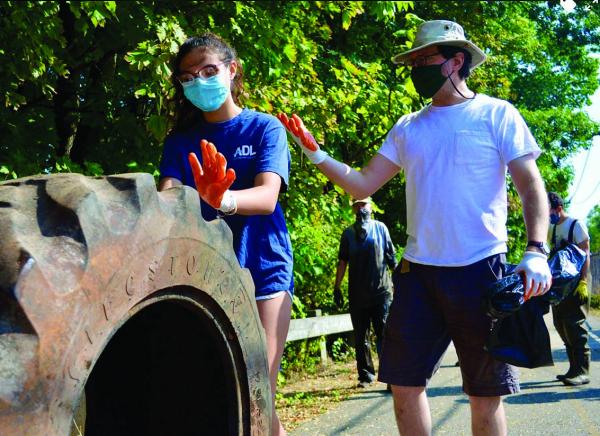November 12, 2020

Volunteers cleaned up the Neponset River during an event organized by the Neponset River Watershed Association in September. Photo courtesy NepRWA
Neighbors received an update on efforts to clean up the Neponset River on Monday night at a virtual meeting that focused on water quality, sediment pollution, and dams that block fish from their habitats.
The online discussion was convened by the Neponset River Watershed Association (NepRWA), a non-profit group that has led efforts to protect the river from dumping and other harm for decades.
Ian Cooke, the group’s executive director, said that water quality in the river remains a top concern, particularly in the lower Neponset segment from Hyde Park to Lower Mills and through to Dorchester Bay where the river is a mix of fresh and salt water.
Water quality, which is monitored by testing at three locations six times a year, is also affected by how the city and state manage stormwater. Water tested from 2018-2020 at Blue Hills Parkway, Ryan Playground, and Adams Street was swimmable based on bacteria levels just 63, 39, and 56 percent of the time, respectively, Cooke said.
Runoff from storms is often the biggest problem, Cooke said, due to Boston’s old plumbing infrastructure. Sewage often manages to get into the river even when it’s not raining through “illicit discharge” pipes. “Any sort of material left on the street is going to end up in either the Charles or Neponset river, or the harbor,” he said. “So we’re trying to deal with that from an educational standpoint and also to work with the city to retrofit infrastructure.”
The organization has mounted a 20-year-long effort to bring herring and shad fish, once abundant in the river, back. The state-owned Baker Dam in Lower Mills and the Tileston-Hollingworth Dam off of River Street in Hyde Park effectively block the fish from accessing 17 miles of their former habitat.
Although past studies have found relatively low levels of lead in the sediment, they show that the Lower Neponset has a specific problem: elevated levels of a synthetic chemical called polychlorinated biphenyls (PCBs), which are hazardous to human health, fish life, and the environment.
The PCBs in the sediment are a grim reminder of the Neponset’s polluted past, when factories along its shore used the river to dump chemical waste into the water.
Cooke explained that the issue over what could be done to address issues with the dams cannot be explored until the elevated PCB levels are tackled. Officials from the US Environmental Protection Agency (EPA) last discussed the issue in public last February, when they briefed a group of about 70 people at a community meeting at Mattapan’s Mildred Avenue Community Center. Although the EPA is gearing up to put the Neponset on the National Priorities List, maybe sometime next year, the subsequent process would “likely be long— and probably take years or decades,” Cooke said.
PCBs pose relatively low risk to humans, but threaten the health of the fish and birds who live there. People are advised not to eat fish caught in the river.
Cooke also highlighted the partnership between the NepRWA and the Neponset Greenway Council and their progress in removing trash from the river, including a massive clean-up on Sept. 30. The Neponset River Festival was cancelled this year due to the coronavirus and will likely be on pause this coming spring, he expects.
Cooke also highlighted the city’s newly released “Coastal Resilience Solutions for Dorchester,” a culmination of the Climate Ready Dorchester initiative to protect the neighborhoods from sea-level rise 50 years from now. The plan could cost as much as $215 million to execute.
“It’s a very thoughtful approach, but it’s also ambitious,” Cooke said. “We need to keep in mind that it’s a plan laid out by the city without any consultation with the state. It will be a tremendous challenge for the city, the residents, and for all of our institutions. I definitely encourage everyone to check out the plan and advocate for the city to continue being proactive about these issues.”


